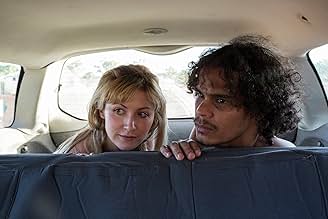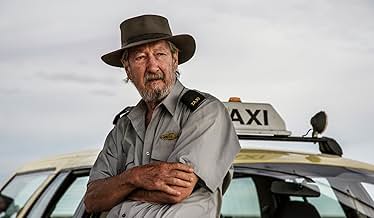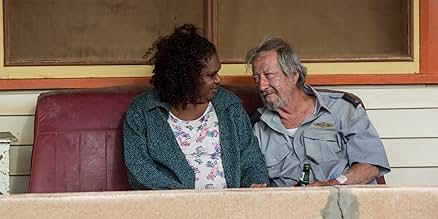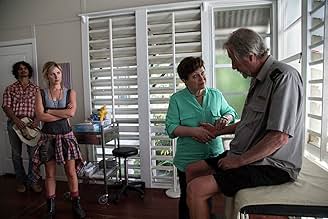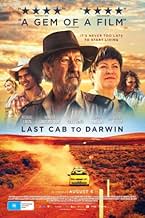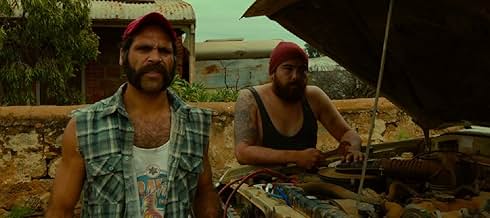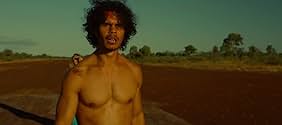VALUTAZIONE IMDb
7,2/10
4384
LA TUA VALUTAZIONE
Aggiungi una trama nella tua linguaWhen Rex, a Broken Hill cab driver, is told he doesn't have long to live, he sets out on an epic journey to Darwin in a bid to die on his own terms.When Rex, a Broken Hill cab driver, is told he doesn't have long to live, he sets out on an epic journey to Darwin in a bid to die on his own terms.When Rex, a Broken Hill cab driver, is told he doesn't have long to live, he sets out on an epic journey to Darwin in a bid to die on his own terms.
- Premi
- 6 vittorie e 24 candidature totali
Ningali Lawford
- Polly
- (as Ningali Lawford-Wolf)
Recensioni in evidenza
I thought this one of the best movies I have seen in a long, long time and up there with the Castle and the Dish. I thought the acting throughout good and especially Michael Caton and the actor who played Tilley who I found to be a lovable rogue. The story line was sad, but was very thought provoking when thinking about and discussion euthanasia. All in all I really enjoyed the story and especially loved seeing the outback of Australia. I cried a lot but I also laughed a lot and would recommend this movie to any age (except children of course) and hope that many people go to see it. I also hope that it is up there when the movie award come out.
Scriptwriter Reg Cribb and director Jeremy Simms have taken the true-life story of Max Bell and put a lens on attitudes about the right to die and aspects of Australian society most of us rarely see.
The film, based on Reg Cribb's 2003 stage play, commences in Broken Hill. Rex, a cabbie played by Michael Caton, has a long-standing relationship with Polly his Aboriginal neighbour. Both have somewhat abrasive personalities, but they complement each other perfectly.
When Rex is diagnosed with terminal stomach cancer, he learns that the Northern Territory has legalised euthanasia. He decides to leave and drive his cab to Darwin to have an assisted death rather than face a lingering one in hospital.
Rex's trip to Darwin is not unlike the journey of the three protagonists in "The Adventures of Priscilla, Queen of the Desert", its across roughly the same area and ends up in the same place, but like that earlier film, it's also a journey of discovery. Along the way, Rex becomes involved with a number of people and they change each other's lives.
Although the film alters Max Bell's experience considerably, "Last Cab to Darwin" allows for another journey; the one through the divide in Australian society that started in 1788 when the original inhabitants and the European settlers were thrown together.
The film seems to reinforce certain stereotypes about Indigenous Australians, especially in the role of Tilly (Mark Coles Smith), however in other ways it shows them as more sharing and less obsessed with material possessions. Tilly's character emerges as a complex one, although brash and cocky on the surface, his underlying fears and self doubts are revealed.
The setting for the film is during that brief period in the mid 1990's when euthanasia was legalised in the Northern Territory, but was quickly shut down by federal law. The film doesn't necessarily advocate euthanasia though; both sides of the argument are played out.
Finally, the performances are so real that some scenes are hard to watch. Michael Caton gave us a modern Australian icon with his Darryl Kerrigan in "The Castle", but he surpasses himself here.
The last scene in "Last Cab to Darwin" is a lump in the throat moment. Maybe the film won't have much of a following outside Australia, but its central theme of the right to die with dignity is universal.
The film, based on Reg Cribb's 2003 stage play, commences in Broken Hill. Rex, a cabbie played by Michael Caton, has a long-standing relationship with Polly his Aboriginal neighbour. Both have somewhat abrasive personalities, but they complement each other perfectly.
When Rex is diagnosed with terminal stomach cancer, he learns that the Northern Territory has legalised euthanasia. He decides to leave and drive his cab to Darwin to have an assisted death rather than face a lingering one in hospital.
Rex's trip to Darwin is not unlike the journey of the three protagonists in "The Adventures of Priscilla, Queen of the Desert", its across roughly the same area and ends up in the same place, but like that earlier film, it's also a journey of discovery. Along the way, Rex becomes involved with a number of people and they change each other's lives.
Although the film alters Max Bell's experience considerably, "Last Cab to Darwin" allows for another journey; the one through the divide in Australian society that started in 1788 when the original inhabitants and the European settlers were thrown together.
The film seems to reinforce certain stereotypes about Indigenous Australians, especially in the role of Tilly (Mark Coles Smith), however in other ways it shows them as more sharing and less obsessed with material possessions. Tilly's character emerges as a complex one, although brash and cocky on the surface, his underlying fears and self doubts are revealed.
The setting for the film is during that brief period in the mid 1990's when euthanasia was legalised in the Northern Territory, but was quickly shut down by federal law. The film doesn't necessarily advocate euthanasia though; both sides of the argument are played out.
Finally, the performances are so real that some scenes are hard to watch. Michael Caton gave us a modern Australian icon with his Darryl Kerrigan in "The Castle", but he surpasses himself here.
The last scene in "Last Cab to Darwin" is a lump in the throat moment. Maybe the film won't have much of a following outside Australia, but its central theme of the right to die with dignity is universal.
A widely recognised characteristic of Australian film is our capacity to find humour in almost any subject. When people from other places try to describe our national character, they use words like larrikin, irreverent, or iconoclastic, meaning we like to laugh at ourselves and the sacred cows in our patch. So how do you laugh at dying, let alone make an Aussie comedy out of a road film that has euthanasia as its destination?
Aussie icons Michael Caton and Jackie Weaver provide the larrikin mix of gravitas and humour needed to make a deadly serious issue bearable as we share the journey and the end-of-life issues facing the terminally ill cab driver Rex. He has never been outside Broken Hill and must drive 3,000 kms to Darwin to be the first person who is legally assisted to die by Weaver who plays a feminine version of Dr Death (as euthanasia advocate Philip Nitschke was called). Like in all road films, he crosses iconic landscapes and encounters bad things. He also meets some beautiful characters like the Pommie backpacker Julie who becomes his nurse, a mischievous Aboriginal Peter Pan-type called Tilly, and Polly, the Aboriginal neighbour and secret lover he left behind but calls regularly. The back story of our nation's inept relationship with the traditional owners of our land frames much of Rex's journey, just as it continues to frame our evolving national identity.
While it is an entertaining Aussie yarn, that's not its only purpose. Superb acting by Caton in particular brings you up close and very personal to the emotional and practical challenges of picking a time and place to die with dignity. The film can get heavy-handed in the way it loads political and moral messages into the story; for example, when Tilly yells at Rex "You think its brave to let someone else do your dying for you?" we are confronted with different ways of looking at assisted dying. Rex makes it to Darwin only to find medical and legal confusion, so things do not turn out as expected. For some, it's a distracting edit to have Rex back home in minutes when it took half the film to get there, but perhaps this reflects the truncation of time when the time has come. Be warned: this is a film that can mess with your head about the complex issue of assisted dying, but it's an Aussie gem well worth the effort.
Aussie icons Michael Caton and Jackie Weaver provide the larrikin mix of gravitas and humour needed to make a deadly serious issue bearable as we share the journey and the end-of-life issues facing the terminally ill cab driver Rex. He has never been outside Broken Hill and must drive 3,000 kms to Darwin to be the first person who is legally assisted to die by Weaver who plays a feminine version of Dr Death (as euthanasia advocate Philip Nitschke was called). Like in all road films, he crosses iconic landscapes and encounters bad things. He also meets some beautiful characters like the Pommie backpacker Julie who becomes his nurse, a mischievous Aboriginal Peter Pan-type called Tilly, and Polly, the Aboriginal neighbour and secret lover he left behind but calls regularly. The back story of our nation's inept relationship with the traditional owners of our land frames much of Rex's journey, just as it continues to frame our evolving national identity.
While it is an entertaining Aussie yarn, that's not its only purpose. Superb acting by Caton in particular brings you up close and very personal to the emotional and practical challenges of picking a time and place to die with dignity. The film can get heavy-handed in the way it loads political and moral messages into the story; for example, when Tilly yells at Rex "You think its brave to let someone else do your dying for you?" we are confronted with different ways of looking at assisted dying. Rex makes it to Darwin only to find medical and legal confusion, so things do not turn out as expected. For some, it's a distracting edit to have Rex back home in minutes when it took half the film to get there, but perhaps this reflects the truncation of time when the time has come. Be warned: this is a film that can mess with your head about the complex issue of assisted dying, but it's an Aussie gem well worth the effort.
10gallae
I saw this film yesterday, choosing it over both "Fantastic Four" and "The Man from UNCLE" and it was a good choice. The trailer - which I saw on tube - only gives you the basic scenario of the film, but NOT what it's about. I have to admit I chose it because it featured Michael Caton, who was also in another classic Aussie film *The Castle*. He, and the other actors in this film have been cast really well. I particularly like Ningali Lawford-Wolf as Polly, and Mark Coles Smith as Tilley.
The film made me laugh and cry, partly because it tapped into my own family history, But I loved the background to this story - the red and greens of the outback, the houses with tin roofs and rock fences - they remind me of Kalgoorlie where I lived at an early age . Also the film, which is based on a play by Reg Cribb, doesn't shy away from social issues that won't go away, but is ultimately uplifting in what it says.
The film made me laugh and cry, partly because it tapped into my own family history, But I loved the background to this story - the red and greens of the outback, the houses with tin roofs and rock fences - they remind me of Kalgoorlie where I lived at an early age . Also the film, which is based on a play by Reg Cribb, doesn't shy away from social issues that won't go away, but is ultimately uplifting in what it says.
"Drink your beer and shut up" is the essence of male culture in Australia. "Mateship" is the term for it. Rex, a 70 year old cab driver from Broken Hill in New South Wales, finds – as he must have already felt for a long time - that mateship is a double edged sword. He is diagnosed with terminal stomach cancer and can't bring himself to tell his friends or the woman he secretly loves. "There's no one else," he tells his doctor. Instead he drives his cab 2,000 plus miles across the Australian outback to Darwin where there is a newly opened and experimental euthanasia clinic. "Why," asks the woman who might have been his wife "did you not tell me?!" "You never asked," answers Rex, matter-of-factly. Rex has never seen the sea, among other things, and his eyes are opened to new scenery and people. His nearness to death is an opportunity to reassess his life and, like Odysseus, for adventure.
While much of the film is drama and serious in nature, it is also light-hearted. A mechanic tells Rex to keep his fluids up while driving in the desert, and Rex promptly goes into the bar for beer. One theme is the plight of Australia's aborigines. Whites took away much of their culture and stories, and as a result, who they are. The acting is really wonderful, especially the lead who is a veteran of Australian films and television and well-loved for such roles for his entire life. I love the ornate and wonderful arts and crafts homes as well as the scenery of Australia. The film is loosely based on a true story. The only real drawbacks are that it is somewhat predictable and short. Seen at the Toronto International Film Festival 2015.
While much of the film is drama and serious in nature, it is also light-hearted. A mechanic tells Rex to keep his fluids up while driving in the desert, and Rex promptly goes into the bar for beer. One theme is the plight of Australia's aborigines. Whites took away much of their culture and stories, and as a result, who they are. The acting is really wonderful, especially the lead who is a veteran of Australian films and television and well-loved for such roles for his entire life. I love the ornate and wonderful arts and crafts homes as well as the scenery of Australia. The film is loosely based on a true story. The only real drawbacks are that it is somewhat predictable and short. Seen at the Toronto International Film Festival 2015.
Lo sapevi?
- QuizIn many Aboriginal cultures the term Auntie is used for any older Aboriginal woman, regardless of family relationships, and occasionally tribe. It's a term of respect and endearment
- BlooperWhen Tilly is in the back of the cab for the first time having a smoke he opens the rear window. There is the sound of a power window opener. That model Falcon only has power windows in the front.
- ConnessioniFeatured in Gaps Between the Stars: The Story of Last Cab to Darwin (2015)
- Colonne sonoreIf Not For You
Written by Bob Dylan
© Big Sky Music
Licensed by Sony / ATV Music Publishing Australia.
Performed by Olivia Newton-John
(P) 1971 Festival Records PTY Limited
Licensed Courtesy of Warner Music Australia Pty Ltd
I più visti
Accedi per valutare e creare un elenco di titoli salvati per ottenere consigli personalizzati
- How long is Last Cab to Darwin?Powered by Alexa
Dettagli
- Data di uscita
- Paese di origine
- Sito ufficiale
- Lingua
- Celebre anche come
- Дарвин - конечная остановка
- Luoghi delle riprese
- Aziende produttrici
- Vedi altri crediti dell’azienda su IMDbPro
Botteghino
- Budget
- 3.992.880 A$ (previsto)
- Lordo Stati Uniti e Canada
- 34.193 USD
- Fine settimana di apertura Stati Uniti e Canada
- 620 USD
- 12 giu 2016
- Lordo in tutto il mondo
- 5.945.585 USD
- Tempo di esecuzione2 ore 3 minuti
- Colore
- Mix di suoni
- Proporzioni
- 2.35 : 1
Contribuisci a questa pagina
Suggerisci una modifica o aggiungi i contenuti mancanti


